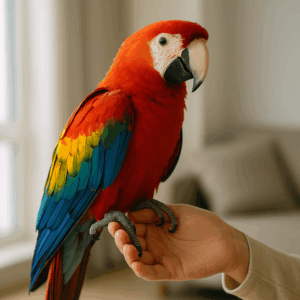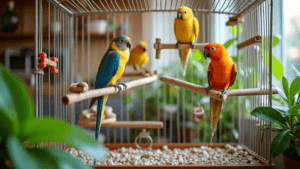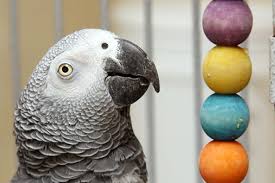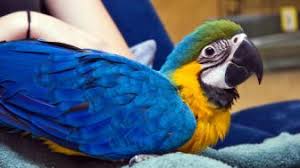Owning a pet bird is more than enjoying colorful feathers or cheerful songs—it’s about building a unique bond with a companion that can bring joy, personality, and even a bit of challenge into your daily life. Birds are fascinating, intelligent creatures, and their popularity as pets is no surprise. In fact, millions of households in the U.S. welcome birds not just for their beauty, but for the companionship and energy they add to a home.
From the chirpy canary to the talkative parrot, each species offers something different. But before you welcome a feathered friend into your home, it’s important to understand what bird ownership really involves. Choosing the right bird is about more than preference—it’s about finding a companion that matches your lifestyle.

Key Things to Consider Before Getting a Pet Bird
1. Lifespan and Commitment
Many birds live for decades. Parrots, for example, can live 40–60 years or longer. Bringing one into your life means making a long-term commitment, often equal to a lifetime companion. Consider if you’re ready for such responsibility.
2. Space and Environment
Your bird’s cage isn’t just temporary housing—it’s their permanent home. The size and design of the cage should allow room for movement, stretching, and play. Birds also thrive when they can spend time outside the cage in a safe, supervised environment.
3. Diet and Nutrition
Birds require more than just seed mixes. Many species need a varied diet that includes pellets, fresh fruits, and vegetables. A well-balanced diet supports not only physical health but also mental stimulation. 4. Noise and Social Needs
Some birds are quiet and content to keep to themselves, while others are highly social and vocal. Canaries may fill your home with pleasant melodies, while macaws or cockatoos can be loud and demanding. Think carefully about your tolerance for noise and your household’s daily routine.
Best Birds for Beginners vs. Experienced Owners
Not every bird is suitable for a first-time owner. Choosing the right one for your experience level will make your journey more rewarding.
For Beginners:
Canaries and Finches – Beautiful, easy to care for, and low-maintenance. Great for busy people or those who want a pet that doesn’t require constant interaction.
Budgies (Parakeets) and Cockatiels – Friendly, social, and trainable. These birds enjoy interaction but are still manageable for newcomers.

For Intermediate Owners:
Lovebirds, Parrotlets, Quakers, and Pionus Parrots – Sociable, playful, and often affectionate. They need more attention but reward owners with companionship and fun person
African Greys, Cockatoos, Amazons, and Macaws – Highly intelligent, capable of speech and complex interaction, but require significant time, training, and enrichment. These birds are best suited for dedicated, experienced keepers.

Everyday Care for Pet Birds
Once you’ve chosen your bird, understanding daily care is essential.
Safe Environment: Birds are sensitive to household hazards like non-stick cookware fumes, scented candles, and toxic plants. Keep their environment bird-safe.
Mental Stimulation: Birds need enrichment through toys, puzzles, and training. Boredom can lead to negative behaviors such as feather plucking or excessive screaming.
Training and Bonding: Simple training sessions build trust and provide mental exercise. Teaching tricks isn’t just fun—it strengthens your relationship.
Hygiene and Health: Wash hands after handling your bird or cleaning the cage, and maintain good hygiene to reduce the risk of diseases such as psittacosis. Regular vet checkups are also important.
Final Thoughts
Bringing a bird into your life is a rewarding journey filled with companionship, learning, and joy. The key is preparation—choosing the right species, creating a safe and enriching environment, and committing to their long-term care.
Whether you’re a first-time bird owner starting with a canary or a seasoned enthusiast considering a parrot, remember: pet birds thrive when their needs are matched with an owner’s love, patience, and dedication.
With the right approach, your feathered friend won’t just be a pet—they’ll become a cherished family member for years to come.


The article provides a compelling overview of why pet birds have become cherished companions for millions of households in the U.S. Beyond their beautiful feathers and melodic songs, birds bring vibrant personalities and unique dynamics into homes, making them more than just pets but true companions. The piece effectively highlights the diversity among bird species, noting how each bird’s distinct charm can appeal to different individuals, whether one seeks a quiet companion or a lively buddy.
Moreover, the article wisely emphasizes the importance of careful consideration before bringing a bird into one’s life. It frames the process of selecting a bird as an opportunity to build a meaningful and fulfilling relationship, underscoring the need to match the bird’s characteristics with the owner’s lifestyle and personality. This thoughtful approach can help potential bird owners make informed decisions, ensuring a harmonious and rewarding companionship.
Thank you for such a great review…,. Much appreciated.
I must add that me African Grey parrot ngave me and friends and family many hours of love and laughter….. Great show-off